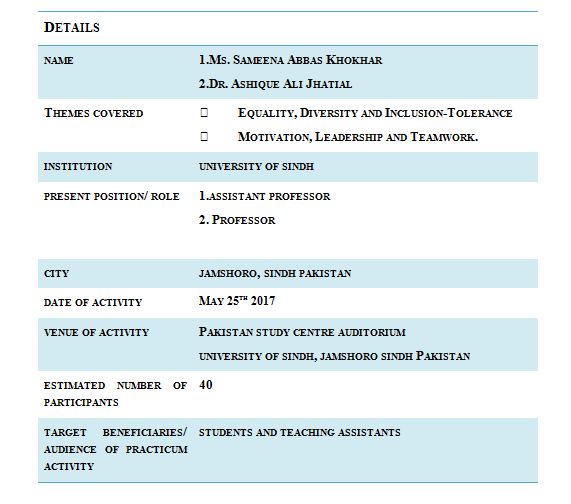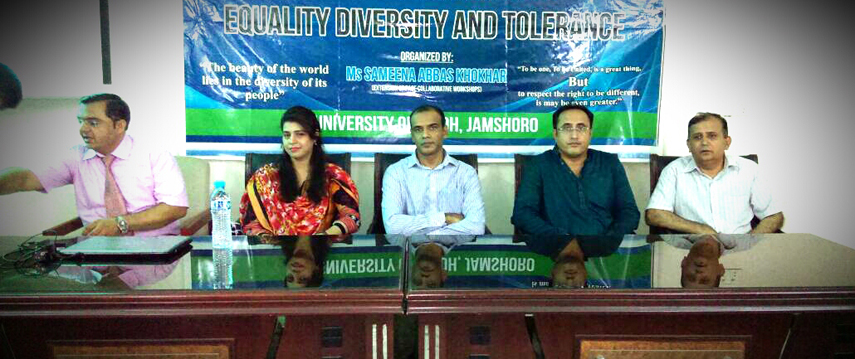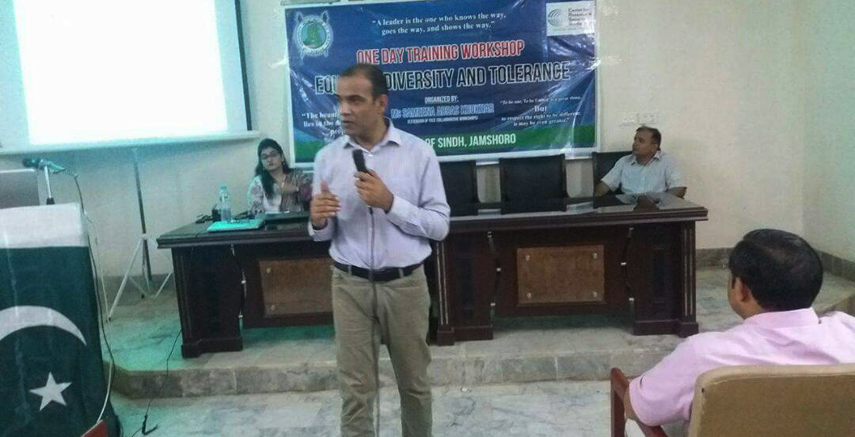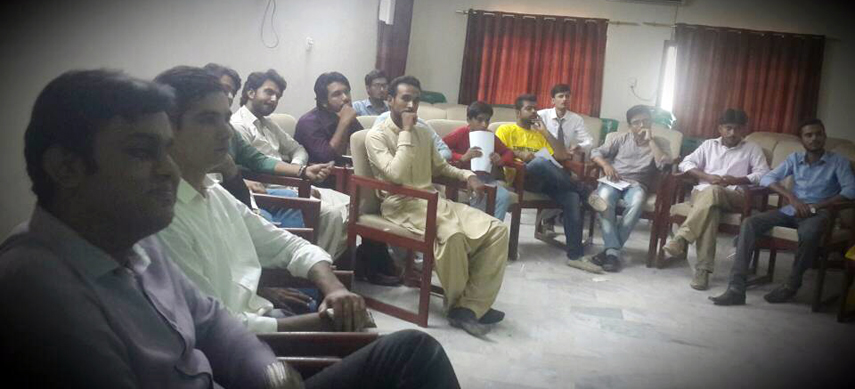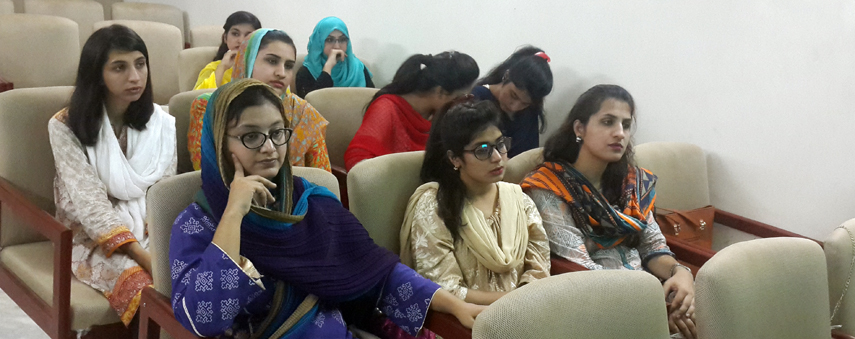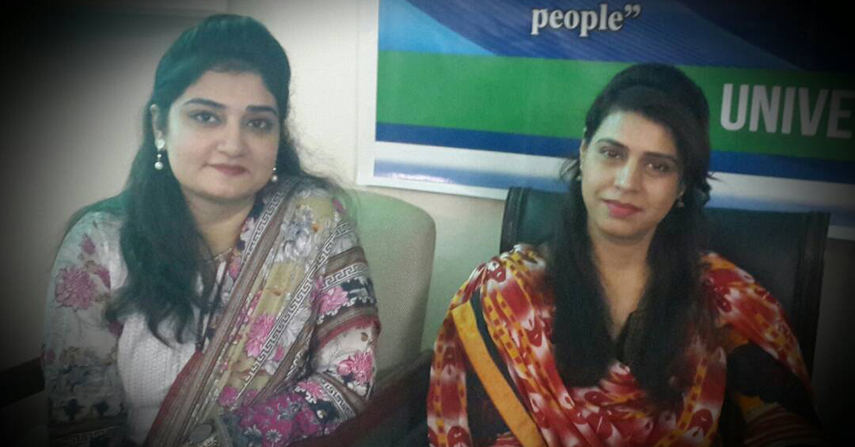The workshop started with recitation of Quran followed by the little introduction to the CRSS and PACE collaborative workshops. The purpose and thematic review of the training was given by Ms. Sameena Abbas Khokhar and the trainers were introduced with a little info about them.
- Thematic Areas covered in the Practicum Activity.
- Equality, Diversity and Inclusion-Tolerance
- Motivation, Leadership and Teamwork.
Session I
Equality, Diversity and Inclusion-Tolerance by Dr. Ashique Jhatial
Dr. Ashique Jhatial before joining as Director Research & Graduate Studies, University of Sindh, has been working as Professor in HRM and Organizational Studies with special focus on CSR, Equality, Diversity and Inclusion. He has been HEC’s Master Trainer and presenter at national and internal level. His research in supervision and publication has focused on variety of socio-cultural, historical and social entrepreneurial domains. He has been actively serving on several advisory boards of NGOs and worked as consultant as well. Some of his research interests include: Ethics, Social Justice, Equality, Diversity and Inclusion, Bullying, Harassment and Discrimination, Business Ethics and Workplace Justice, Ethnicity, Injustice, Social Exclusion and HRM, Islamic Work Ethics, Aggression at Work, Compassion at Work, Entrepreneurship and Social Entrepreneurship, Women Entrepreneurship, Corporate Social Responsibility, Corporate Social Performance, Corporate Governance, Psychological and Social Contract (CV enclosed for reference).
More recently, he has presented his research with his colleagues Cornelius, N. and Wallace, J. (2014) Investigating EDI policy and its Impact on Bullying, Harassment and Discrimination in Public and Private Organisations in Pakistan, 7th Equality, Diversity and Inclusion International Conference 8-10 June 2014, Munich, Germany. Technische Universitat Munchen. Similarly, he has another paper to be presented with same colleagues as stated above, (2017) Fragility and Conservativism: EDI Policy and Practice Disjuncture in the Politicised Workplace in Pakistan, 10th Equality, Diversity and Inclusion International Conference, 28-29-30 June, Brunel Business School, Brunel University London, UK.
Keeping in view of his relevant experiences as stated above, Dr. Jhatial was requested to share his thoughts with participants. He delivered special session in the beginning. His talk slides enclosed for reference.
He delivered his talk on “Equality, Diversity and Inclusion-Tolerance”. In the beginning he introduced very concepts of the title and oriented participants with various faith in terms of religion, political, ethnic and individual differences so that participants grasp the main theme of the workshop for whole the day.
ACTIVITY
He also introduced an activity with special focus on how we discriminate people with disability and age. Four groups were prepared, each group member was handed in some worksheets with some pen/markers to pen down some ideas to discuss with group members. Participants were highly encouraged to ask questions or share their experiences. After intra-group discussion, one leader was chosen who represented their group voice and a small presentation and debate was carried out.
Dr. Jhatial, after small activity, presented various constitutional provisions such as Article 11, 17, 18, 25, 37(e) and 38 of 1973 Constitution which speak about equality, diversity and inclusion-tolerance. In addition to that participants were introduced several other legal frameworks such as IRA 2012, Factories Act 1934, Protection of Women against Harassment at Workplace that substantiate the Constitution of the nation and guide us all for respecting each other at work and in the society at large. Dr. Jhatial also involved participants and made their groups to debate the legal frameworks and figure out what could further be done in this regard to promote equality, diversity and tolerance.
Dr. Jhatial extensively spoke about Pakistan legal frameworks and also introduced similar and more robust legal and administrative frameworks of United Kingdom that guide people in their way of life.
Session II
Motivation, Leadership and Teamwork by Ms. Sameena Abbas Khokhar
The lecture was delivered on multimedia, the trainer introduced the topic and its core contents. It started with a pre lecture activity; the participants were asked to watch the slide story titled; Good old lessons in Motivation, Leadership and teamwork from an age-old fable The Tortoise And The Hare. They enjoyed the slide show and developed an interest into the topic to be discussed.
The trainer attempted to build an understanding of students on motivation, leadership and teamwork. The participants were encouraged to share their pre conceived ideas on the topic and share their views. The objectives to be covered on the topic were presented to the participants.
Objectives were:
- What is motivation?
- Why motivation? Importance of motivation
- How to be motivated?
- Describe what motivates People
- What’s the connection between Motivation and Leadership?
- What is effective leadership
- Describe ways to develop leadership skills
- Define a team and its function
- Identify the characteristics of team
- Importance of teamwork
The definition of Motivation was shared as an internal drive that causes people to behave in a certain way to meet a need, the driving force within individuals by which they attempt to achieve some goal in order to fulfill some needs or expectation. Motivation comes from within
It was further told that there are several factors that contribute to motivation (not just monetary). Both Intrinsic and Extrinsic features of motivation were discussed further.
After that the participants were asked if they know any type or feature of motivation before it was explained by the trainer. Their replies were varied; some participants could reply accurately however some presented their guesses. Then the trainer shared the features, which were; Complex, Psychological, Physical, Unique to each and every person, Context sensitive and not fully understood.
When asked what does motivation as a force do to you, the participants got excited and replied with their personal life experiences. The trainer briefed to them the outcomes i.e. motivation energizes behavior, directs behavior, enable persistence towards a goal, and exists in varying details.
Activity 1:
The participants were given the handouts with list of the features of motivation and de-motivation and were asked to choose top 5 for themselves. All of them took 5 minutes to select then justified their selection.
The list had the following items;
- Failure can be a motivator.
- No one can motivate another person for the long term.
- Fear is an effective way to motivate people.
- It is important to have some motivational reminders.
- Everyone is motivated by the same thing.
- Reading motivational books and listening to motivational tapes is a good way to motivate ourselves.
- People who are motivated have more extroverted personalities than those who are not.
- To maintain motivation, it is important to have balance in our lives.
- Making wise choices is an important part of motivation.
- Too much uncontrolled stress can cause us to lose motivation.
- Keeping a record of our success and achievements can help us stay motivated.
- Desire is a key factor in motivation.
- Too high expectations can cause us to become de-motivated.
- Having a plan can help us stay motivated.
- It is important to have intangible goals to stay motivated.
- We get motivation from our parents and important people in our life.
- Success means different things to different people.
- Personal organization can help us gain and sustain motivation.
- It is important to celebrate from time to time as we move towards our goals.
- Persistence is a key factor in motivation.
Another Item of the topic was introduced to the participants; Leadership. They were asked to choose any one of the following options before they are told about it.
- Is leadership a position of office or authority?
- Is leadership ability in the sense that he is a leader because he leads?
It was shared that a leader is a person who influences a group of people towards the achievement of a goal”.
A leader by its meaning is one who goes first and leads by example, so that others are motivated to follow him.
To be a leader, a person must have a deep-rooted commitment to the goal that he will strive to achieve it even if nobody follows him!
The participants were encouraged to select any five features that make a Good Leader out of the given list.
- Character
- Enthusiasm
- Confidence
- Decisive
- Tolerant
- Goal Oriented
- Commitment
- Good Example
- Humility
- Appreciation
- Listening
- Optimistic
- Admits Mistakes
- Has Fun
- MOTIVATED
ACTIVITY 2
A situation was given; groups were made to discuss the possible solution. Blank sheets were given to write their solutions and provide logical reason for that.
If the room was on fire, there’s panic amongst the staff, how would a good leader directs his or her employees?
The groups discussed for 5 minutes then came up with different solutions, it was such a wonderful activity which involved all the participants with full interest.
Lastly, the third item of the topic was delivered, Teamwork. It was defined that, TEAM is a group of people linked to a common purpose. In a team setting, members share accountability and responsibility. They were also told of the stages of team development and performance.
- Forming stage: getting to know and form initial opinions about team members
- Storming stage: some team members begin to have conflict with each other
- Norming stage: team members accept each other and overcome the conflict
- Performing stage: team works on task
- Adjourning stage: team completes task and brings closure to the project
Characteristics of Team member were shared as; should know team goals and objectives, every activity should contribute to team goals and objectives, trustworthy, performer, efficient, communicator.
ACTIVITY 3
2 teams of students were made.
They were given an agenda, a problem and possible solutions for that. One member was chosen by the groups as their team leader. This was an activity to see how team leader and members should work together for any cause, issue or a problem. Handouts were delivered.
The teams showed great interest and actively participated in it.
ACTIVITY 4
All the participants were given 3 blank A4 size sheets and were challenged to pass through it, by tearing the paper, or making hole but not to damage its 4 corners. They made efforts, made fun and tried out in different ways. One student could do it and was given a 100 rupee prize. All of them understood how they can do anything, meet up any challenge and with efforts solve any riddle.
- Discussions and Questions.
Trainings are always fruitful and positive for the development of the participants. Other than the regular courses, trainings are quite important for students, as it imparts the knowledge, skills and critical thinking by getting them involved into activities. Students raised many queries during the training. Following few questions and feedback is most relevant to share.
- What are the laws in Pakistan that govern ‘equality, diversity and tolerance?
- How to minimize intolerance at individual level in the society?
- What are the main objectives that could these workshops do for general public and how to evaluate general laws and their implementation?
- What motivates an individual towards reaching his/her goals in such a chaotic society?
- How to be motivated and retain one’s motivation?
- Why can’t we find good leaders now a day?
- How to become a motivated leader?
- Why can’t we see teamwork in institutions, academies, politics etc?
- Which one is best to follow-inner or outer motivation?
- Issues in conducting the training and feedback from the participants.
General issues:
There were no issues faced other than the electricity breakdown in middle. However students appreciated and encouraged us to have more such trainings for them as they lack in such opportunities.
There were students from various disciplines, i.e. English, Sociology, Commerce, Mathematics, IT and Sindhi. Four participants were the teaching assistants at university of Sindh.
All of them thanked us and through us the PACE workshops team for such an opportunity to learn and understand the complex issues of society and an individual.

